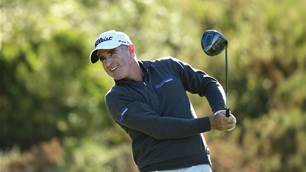His departure from the international scene after the 1995 World Cup in Britain came as a major culture shock to the Kiwis,
His departure from the international scene after the 1995 World Cup in Britain came as a major culture shock to the Kiwis,
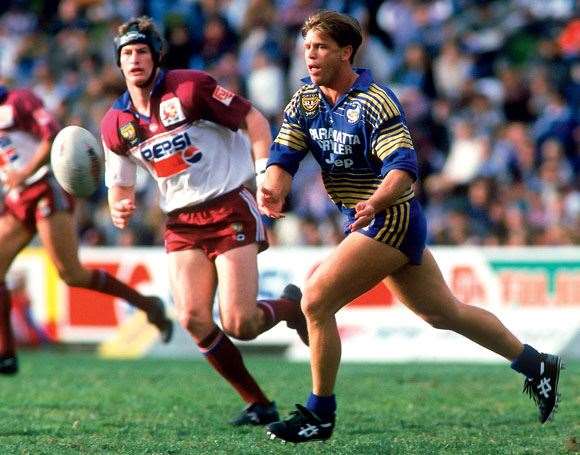 Igniting it for the Eels. Image: Getty Images
Igniting it for the Eels. Image: Getty ImagesBefore the quick-stepping Benji Marshall, before “The Little General” Stacey Jones and before those clever Paul brothers,
New Zealand rugby league pinned its on-field organisational hopes on tenacious number seven Gary Freeman … for a long, long
time. His departure from the international scene after the 1995 World Cup in Britain came as a major culture shock to the Kiwis, who enjoyed his services in 46 Tests over nine years, including a record-breaking stretch of 37 consecutive appearances.Equally as glad to see the back of the ultra-patriotic and ultra-competitive halfback were his opponents in the weekly suburban gladiatorial arena that was the New South Wales Rugby League. He got his hands dirty starring for 1988 and ’89 grand finalists Balmain Tigers, the Eastern Suburbs Roosters (where he landed club footy’s ultimate individual prize, the Dally M, in ’92), the Penrith Panthers and finally the Parramatta Eels in a year-long lap of honour.Since then he’s been seen in the New Zealand Kiwis coach’s box and in Camp New South Wales, helping head mentor Wayne Pearce in the early 2000s. These days he can be spotted by Fox Sports’ NRL viewers mid-week and on game n
ights and can be heard spreading “wizdom” on Sky Sports Radio’s Big Sports Breakfast.Inside Sportshared a couple with “Wiz” after he knocked off from a hard day’s work for gaming machine company Konami (where he’s state sales manager) to get his thoughts on how the “greatest game of all” is still great
Does it get any better than sitting around talking footy with a bunch of your former on-field rivals during Monday night football and on Wednesday for NRL On Fox?
The Monday night show is massive now, the ratings are going through the roof. And NRL On Fox is great, too. We have “Wazza” (host Warren Smith), “Lozza” (Laurie Daley) and Gary Belcher. The best thing about it is that everyone gets on fantastically. We love the game, we’re honest, open. Sometimes I’m a little over the edge, but you’ve got to have an opinion because that’s what people watch and listen for. We’re in a position where we have to comment. It’s about being honest. Viewers and fans don’t want to hear made-up stuff, they want to hear it as it is.
How hard is it listening to media types and fans who’ve never played the game rant and rave about teams’ form and how the game should be run?
Honestly, the fans, to me, are who run the game. If you don’t have fans, you don’t have football sides … you don’t have sport in general. I use Cronulla as an example. Those fans, that core who gets out there, there’s about 300 of them at the ground every week with their jerseys on in the toughest of times, and then there’s the thousands of other people at all the other clubs who buy season tickets each year. Mate, the fans are who the game’s made for.
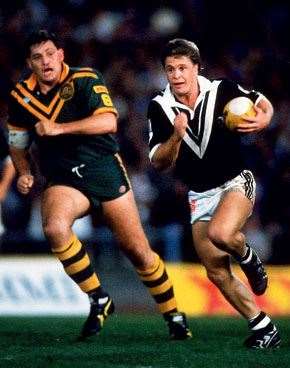 On the attack for the Kiwis. Image: Getty Images
On the attack for the Kiwis. Image: Getty ImagesAre today’s NRL players appreciative of fans’ dedication to them and the game?
I think they’re very appreciative. Players do a lot that’s positive and don’t get recognised for it … a lot of players don’t even want recognition for it. To me, if you’re in a situation where fans want to see you and talk to you about the game, that’s how it should be. Being in the gaming industry, we do a lot of days out for charity. My good mate Darryl Brohman and I will turn up to these events as much as possible. There’s a golf day run by Penrith RSL which we’ve been supporting for 12 years. We’ll also get behind people like Banardos; kids with disabilities, mental and physical …
Is league still as “fun” as players make it out to be?
It’s a business now, but I think the players are still having fun out there. There were two rounds in particular this year – 13 and 14, the way the players adapted and the way the referees adapted – which were the best two rounds I’ve seen for a long time. Players were in each other’s faces, some magnificent tries were scored. As for the intensity and physicality, I think the referees are letting sides move in closer to each other, just like they do in State Of Origin matches.
We look at someone like Nathan Hindmarsh, who finishes banged up and bloody around the head, and think, “Look at the state he’s in.” After a game he’ll sit down and have ice packs all over him. They all get bruised. It’s just the nature of the beast. At some stage of the game you’re going to get bruised. The players do it because they love it.
What, in your opinion, were your greatest strengths as a player in your heyday?
I’m not quite sure … I don’t want to sound big-headed or anything, but you’ve got to be a competitor – when the whips are cracking, you’re there. Sometimes I was there, sometimes I wasn’t. We’ve all had poor games, we’ve all had great games. From a New Zealander’s point of view, I was always trying to prove I could handle myself in the competition over here. As a little kid watching Amco Cup games which were fed across to New Zealand, I’d think to myself, “Geez, that would be the place to play, where you’re up against the best week in, week out.”
You were a cheeky halfback in your day. Which vocab worked best in unsettling your opposition?
You could say I was yappy. People who know me might laugh at this, but I used to try and wait for players from the other side to say something first. People might not see it that way, but there were plenty of things which used to go on that went unnoticed. In the end, the major focus for me was to outplay my opposite, or limit his ability in the game. I don’t think many people used to like playing against me, though!
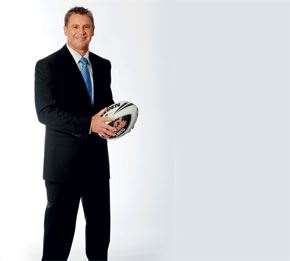 Gary Freeman Portrait. Image: Fox Sports
Gary Freeman Portrait. Image: Fox SportsIs there anything in rugby league which is really getting your goat these days?
I feel sorry for the refs. I think theirs is the hardest job in the game. I’ve never refereed a game. I’ve refereed touch, that was hard enough, a mixed touch comp … not the best place to be. Referees are under the microscope more than ever. In the end they
don’t really lose games, players lose games by missing tackles, dropping balls. There are areas which need to be attended to, but I think the refs are scrutinised pretty heavily. Like a player, if a ref has a good game, he’ll get praised, and if he has a bad game, he’ll get hammered. It’s just that we like hammering refs a little bit more. I had no dramas when I was playing. I talked to the referees all the time. I’d often try and explain some of the rules to them during the game. They loved that … I think they thought sometimes that I was refereeing the game!
We’ve just seen another blockbusting Origin series. As a Kiwi, how excited do you get about the concept?
I love it. I was fortunate enough to be involved when Wayne Pearce was the NSW coach in 1999-2000. I gained a perspective of what players go through, what they’re thinking, how they act. I think it’s fantastic. Beside Test matches, that’s the other ultimate level everyone wants to play at. Origin’s an Australian-based concept and it should stay that way. Kiwis should be proud to play Test matches against Australia and that’s the way it should stay.
Only asking this ‘cause you’re a Kiwi ... Did you give rugby union a go before you settled into league?
Yeah, I was terrible … shocking. I think they tried me in every position and in the end they said, “We think you should go away and play something else.”
– James Smith
Related Articles
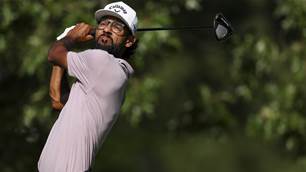
Bhatia leads opening FedEx Cup playoff as Aussies falter
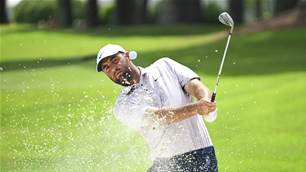
Scheffler 'rested, ready' to fire again as Playoffs kick off
